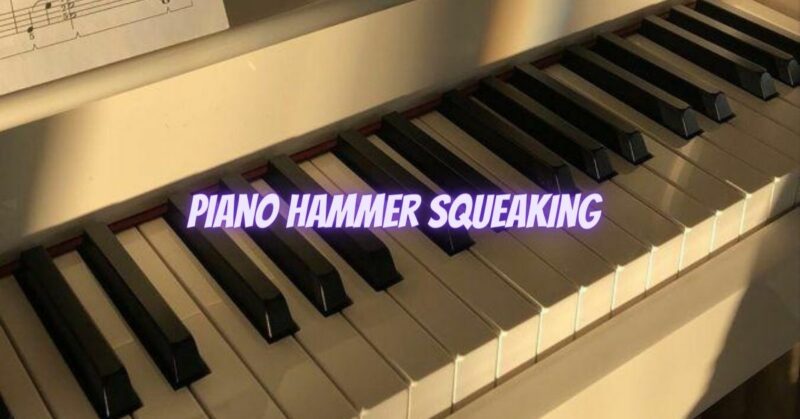Piano hammer squeaking is an undesirable noise that can occur when the hammers strike the strings. It is often characterized by a high-pitched, friction-like sound that can affect the overall tone and playing experience. If you’re experiencing piano hammer squeaking, there are several potential causes and solutions to address the issue. Here’s a guide to help you identify and fix piano hammer squeaking:
- Identify the Source: Before attempting any repairs, it’s essential to identify the source of the hammer squeaking. Play each affected note and listen carefully to determine which keys are causing the squeaking sound. Inspect the action and hammers to look for any visible issues.
- Check for Dry or Worn Hammer Felts: One of the most common causes of hammer squeaking is dry or worn hammer felts. Over time, the felt on the hammers can become dry, causing increased friction when striking the strings. Inspect the hammer felts for any signs of wear or dryness. If needed, apply a small amount of piano hammer lubricant to the felts to reduce friction and eliminate the squeaking.
- Lubricate Moving Parts: Piano actions consist of several moving parts, including flanges, pivot points, and capstans. These components can sometimes produce squeaking sounds due to friction. Applying a small amount of piano action lubricant to these moving parts can help reduce squeaks and improve overall action performance.
- Adjust the Piano Action: Proper piano action regulation ensures that the hammers strike the strings at the correct angle and with the appropriate force. Improper regulation can lead to uneven hammer movement and squeaking. Adjusting the key dip, let-off, and drop can help eliminate squeaks and improve the action’s responsiveness.
- Check for Loose Components: Loose components within the action can also cause squeaking. Inspect the hammer flanges, capo d’astro screws, and other action parts to ensure they are securely in place. Tighten any loose screws to eliminate potential sources of noise.
- Examine Damper Felts: In some cases, the damper felts can cause squeaking when they come into contact with the strings. Inspect the damper felts for wear or misalignment and adjust or replace them if necessary.
- Seek Professional Help: If the hammer squeaking persists despite your efforts, it’s best to seek the assistance of a qualified piano technician. They have the expertise and specialized tools to diagnose and resolve complex issues effectively.
Conclusion: Piano hammer squeaking can be an annoying problem that affects the instrument’s sound quality and performance. Identifying the causes of squeaking and implementing appropriate solutions is crucial to restore the piano’s optimal playing condition. Performing regular maintenance, lubricating moving parts, and adjusting the piano action can help prevent squeaks and maintain the instrument’s responsiveness. For more complicated issues, seeking professional help from a skilled piano technician is recommended to ensure the problem is addressed correctly. With proper care and attention, your piano can produce a beautiful, smooth, and squeak-free sound for many years to come.


